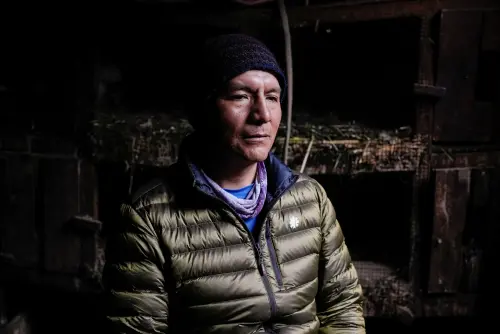HAMM, Germany, March 17 (Reuters) - A German court resumed hearing a significant case on Monday brought by a Peruvian farmer. He contends that the emissions of the German energy giant RWE have contributed to the melting of glaciers, thus increasing the flood risk to his home.
This case has the potential to establish a precedent for future climate litigation by holding companies accountable for previous emissions and compelling them to assist in funding climate adaptation for affected communities.
Lliuya, supported by the activist group Germanwatch, is seeking around 21,000 euros ($23,000) from RWE to contribute to a $3.5 million flood defense project.
Utilizing data from the Carbon Majors database tracing historic production from leading fossil fuel and cement producers, Lliuya argues that RWE has been responsible for nearly 0.5% of global manmade emissions since the industrial revolution, thus justifying a proportional share of the costs of global warming they have caused.
Legal experts are closely monitoring the potential ramifications of this case, seeking to understand the precedent it may set, as noted by Sebastien Duyck, a senior attorney with the Center for International Environmental Law.
The discussion on the financial contributions industrialized countries should make to address the impacts of global warming has been ongoing, culminating in last year's COP29 meeting in Baku.
Since then, the U.S. under President Donald Trump has announced its withdrawal from the U.N. process, while other developed nations are reallocating aid budgets to domestic priorities or defense expenditures.
Harjeet Singh, the founding director of the Satat Sampada Climate Foundation, emphasizes the potential of cases like Lliuya's to potentially create alternative funding mechanisms for addressing climate-related challenges.
RWE, operating coal-fired power plants, argues that no single emitter of carbon dioxide can be solely held liable for global warming, likening it to holding every motorist accountable, as stated in their response.
Initiated in 2015 in Essen, RWE’s headquarters, the case was initially dismissed but was subsequently taken up by the Higher Regional Court of Hamm in 2017.
The court's initial task is to ascertain whether the melting glaciers are indeed elevating water levels in Lake Palcacocha, located over 4,500 meters (15,000 feet) above sea level, posing a direct threat to Lliuya's home in Huaraz over the next three decades.
Experts appointed by the court visited the site in 2022, with their reports slated for release in 2023 and 2024 for examination during the two-day hearing.
Regarding the potential risks, Lukas Arenson, a geotechnical expert and vice president of the International Permafrost Association, highlighted the importance of considering the heightened risk of rock slides from permafrost regions, crucial for mountain stability, often overshadowed by the focus on ice avalanches.
Should the court find evidence of a specific flooding risk to Lliuya's home, the subsequent analysis will delve into the impact of climate change and greenhouse gas emissions on the melting of Andean glaciers and the elevated risks, likely extending the proceedings by another two years.
Experts, like climate scientist Friederike Otto from the Grantham Institute for Climate Change and the Environment, point to a substantial causal link, supported by an attribution paper, indicating the glacier retreat is solely due to climate change.
A 2021 study conducted by Oxford and Washington universities established a direct connection between the melting of a glacier in the Peruvian Andes and human-induced global warming.
Roda Verheyen, Lliuya's legal representative, expressed satisfaction that the court had taken on the case, a positive development considering the initial skepticism: "Saul ... had very little to no hope that this would get anywhere. And now we're all here."
($1 = 0.9192 euros)
